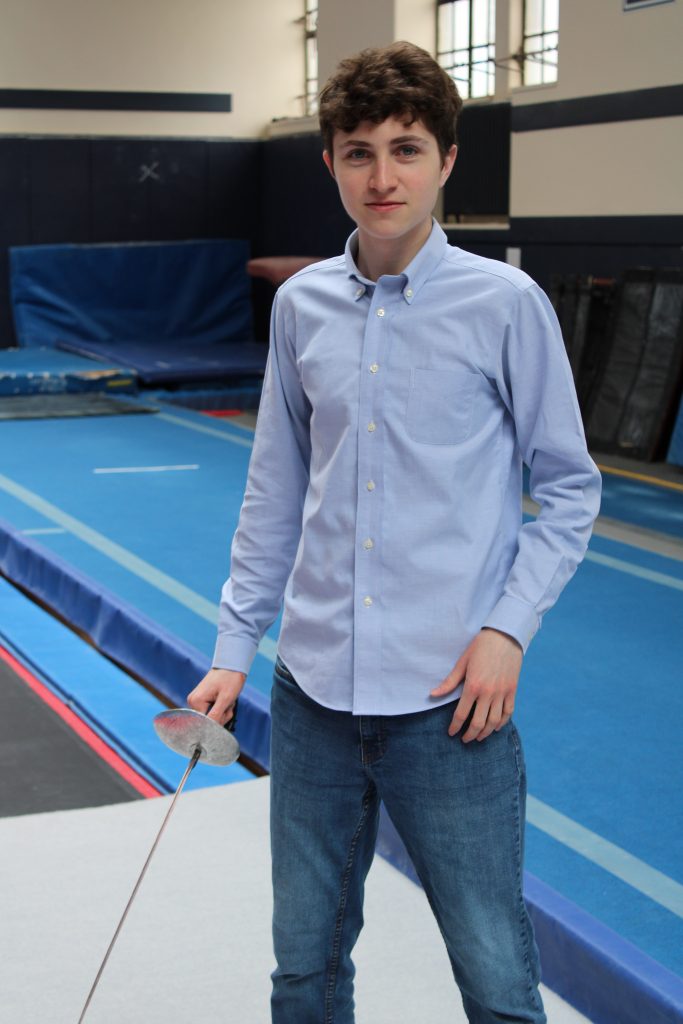Passions Converge in SRP
The Science Research Project offers students an opportunity to investigate a topic meaningful to them and enhance their knowledge of the sciences. For fencing enthusiast Alex Greene ’22, that meant a deep dive into the sport’s techniques — and his first publication in a peer-reviewed journal.
When Alex Greene ’22 was a freshman at Regis, he remembers talking with his brother Cameron Greene ’20 about the research Cameron was doing as part of the school’s Science Research Project, an independent study program that for decades has allowed students to work one-on-one with faculty members to investigate some question of particular interest to them. Cameron was studying the movement of fencers’ legs, and Alex was intrigued that his brother was combining his interest in science with the sport that the two had long participated in outside of school.
Alex first tried fencing at age 11 after he lost interest in soccer and thought that sword fighting sounded like a cool alternative. He quickly took to it, honing his skills and traveling to regional and national tournaments. He caught the science bug a few years later during his first year at Regis, where he enjoyed his freshman biology class as well as the “cool dissections” he did as a member of the Medical Science Club.
Alex decided to follow in his brother’s footsteps and sign up for SRP himself, though he didn’t immediately try to find his own way to connect science and fencing. (His first project involved studying the effect of growth hormones in radishes.) But as he was deciding on a topic for junior year, Greene circled back to the idea of combining his academic and athletic interests.
“Measuring the length of radishes isn’t as interesting as something more practical and more dynamic,” he said.
Working with his faculty advisor, Mr. Xavier Simon ’05, Greene decided to explore the effect of arm kinematics on blade velocity, studying the angles of competitors’ elbow joints and wrists to determine if there’s an optimal position. He designed a study, then took a high-speed camera to his fencing studio to observe a number of athletes as they competed. Working with Mr. Simon, he learned how to gather data in a way that was scientifically sound and how to interpret it. His research found that the optimal elbow joint angle at initiation for saber fencers might be 110 degrees, and that coaches would be wise to place more importance on optimizing elbow joint angles earlier in training.
After Greene presented his completed work at the end of his sophomore year, Mr. Frank Barona approached him with a suggestion.
“He looked at it and said, ‘Alex, you should publish this.’ And I’m like, “Cool, what do you mean by that?” He laughs when remembering the moment now, but the comment set the stage for his senior-year project: learning the ins and outs of turning research into a professional manuscript.
Greene began researching potential journals and worked with Mr. Simon to learn how to identify existing research, present his own work in line with industry norms, and revise the article until it was ready for publication. He eventually found a home for his work in the Journal of Emerging Investigators, which publishes research from middle school and high school students. The study was
published in March, during Greene’s first year at Yale.
“It was exciting and long in the works,” said Greene. “The fact that I started off from SRP and learned how to do this research and then ultimately got it published, it was very meaningful and fulfilling.”
Mr. Simon is quick to praise his former student. “He was very diligent and thorough in his work,” he said. And while Greene worked with faculty members in the Science and Math departments over the course of the project, Mr. Simon credits him with spearheading the whole project. “Really Alex was steering the ship and making sure his boat would make it to the end of the journey,” he said.
Mr. Barona said that Greene’s research is a great example of how SRP offers students interested in science an opportunity to conduct meaningful research beyond what they could learn in a classroom.
“At some point Alex realized he knew more about what he was doing than anybody else and that’s exactly what’s supposed to happen,” said Mr. Barona. “Becoming an expert, even if it’s about this tiny little thing, is educationally transformative, which is the whole point of this.”
The Year in SRP
A sampling of projects that students worked on this past year.
Will Filocamo ’25 is using a simulation tool to test the claim that the rounded corners of U-Haul trucks significantly reduce wind drag and increase fuel economy by up to 20 percent.
Jason Alperin ’24 is studying the behavior of Daphnia, a common water flea, in an environment of micro-gravity.
Brandon Wilk ’24 is investigating the effect of pollutants on Cilia population in water.
Julien Bober ’24 is testing the efficacy of various memory-retention strategies in foreign-language vocabulary retention.
Charlie Mango ’25 is studying how certain bacteria have the ability to physically copy and transfer from plasmids to other bacteria — and how these plasmids can encode antibiotic resistance. Specifically, he’s looking at oleic acid, which may have the ability to inhibit that conjugation.
Read more Regis news
